高二上学期期末考试英语模拟试题及答案
图片预览
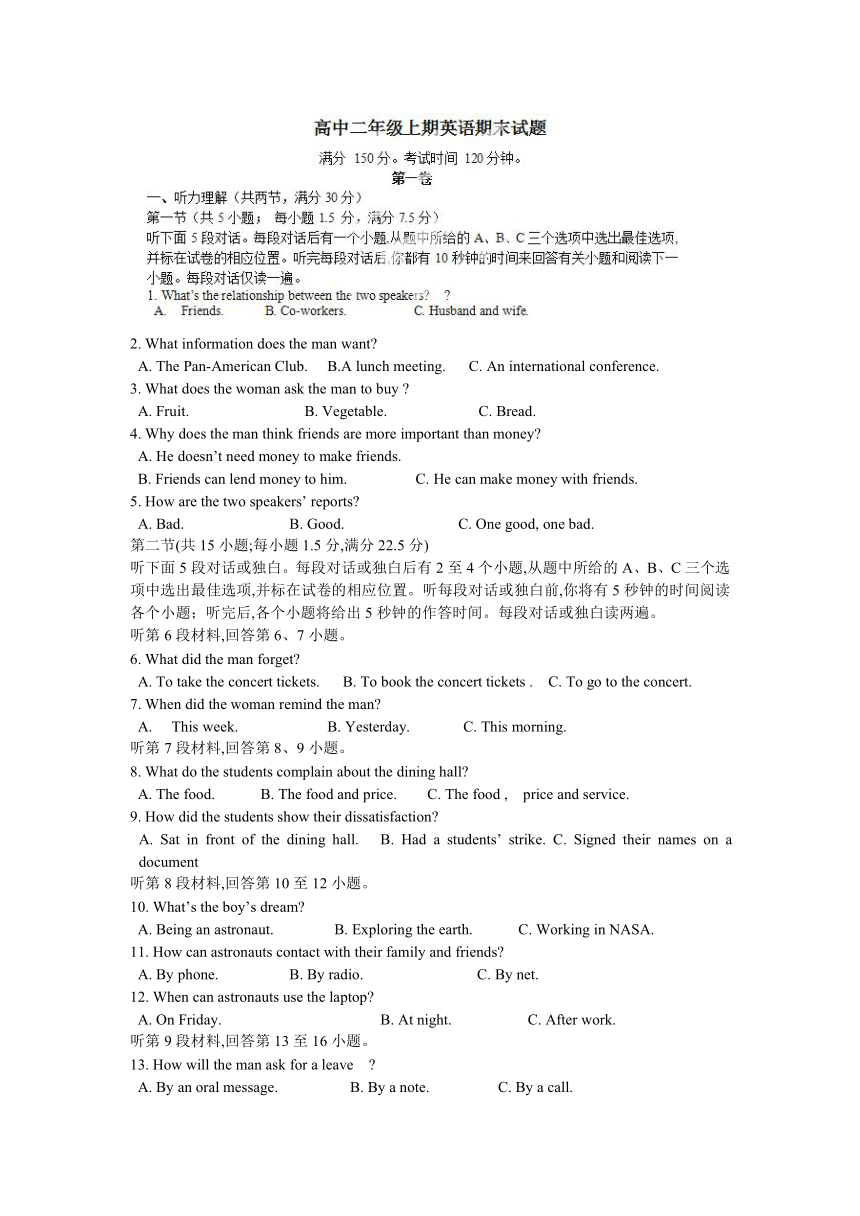
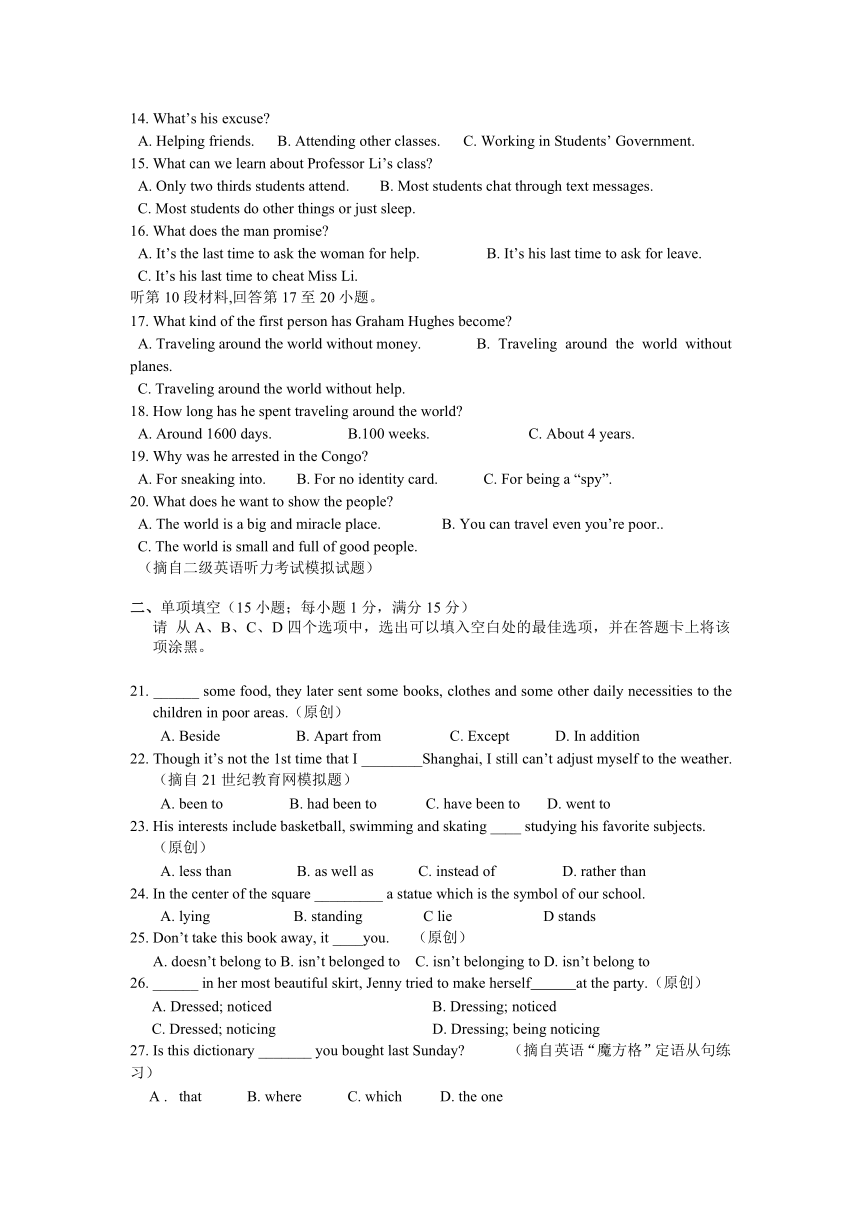
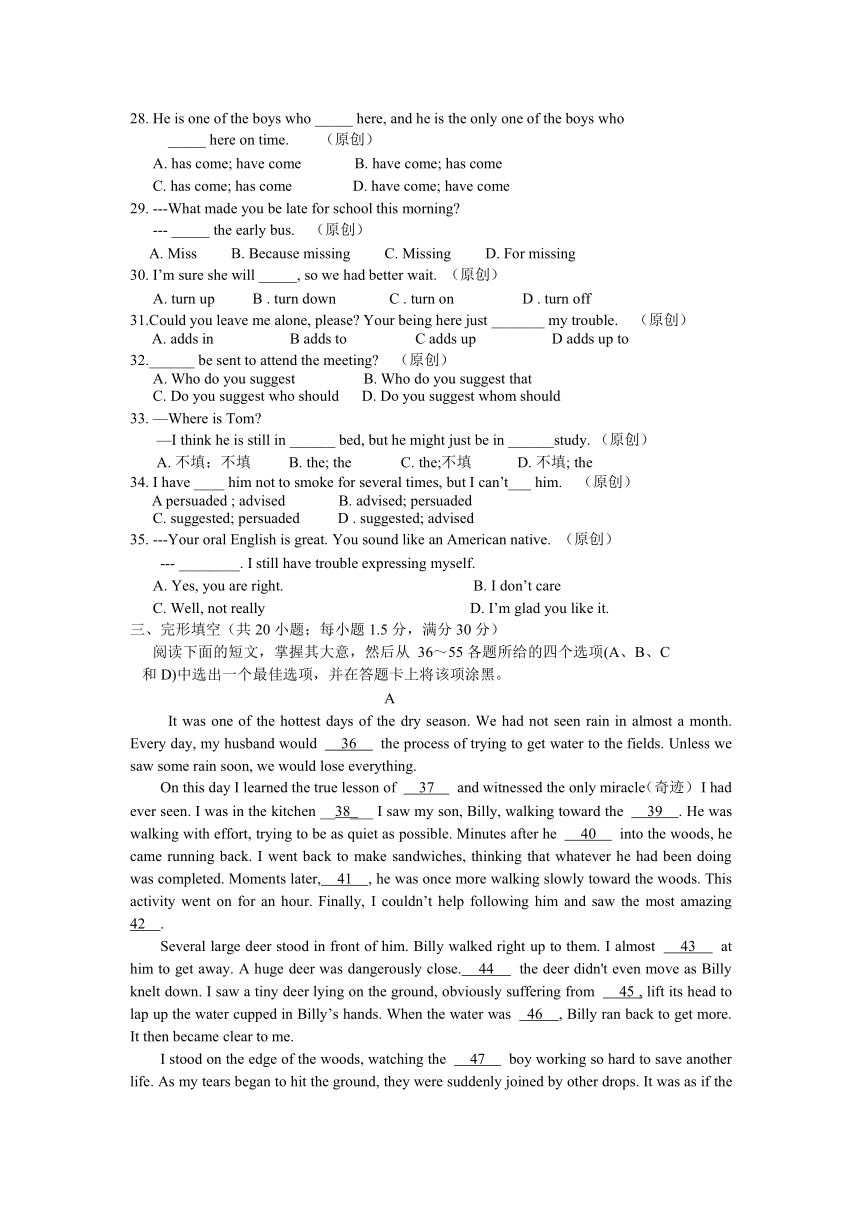
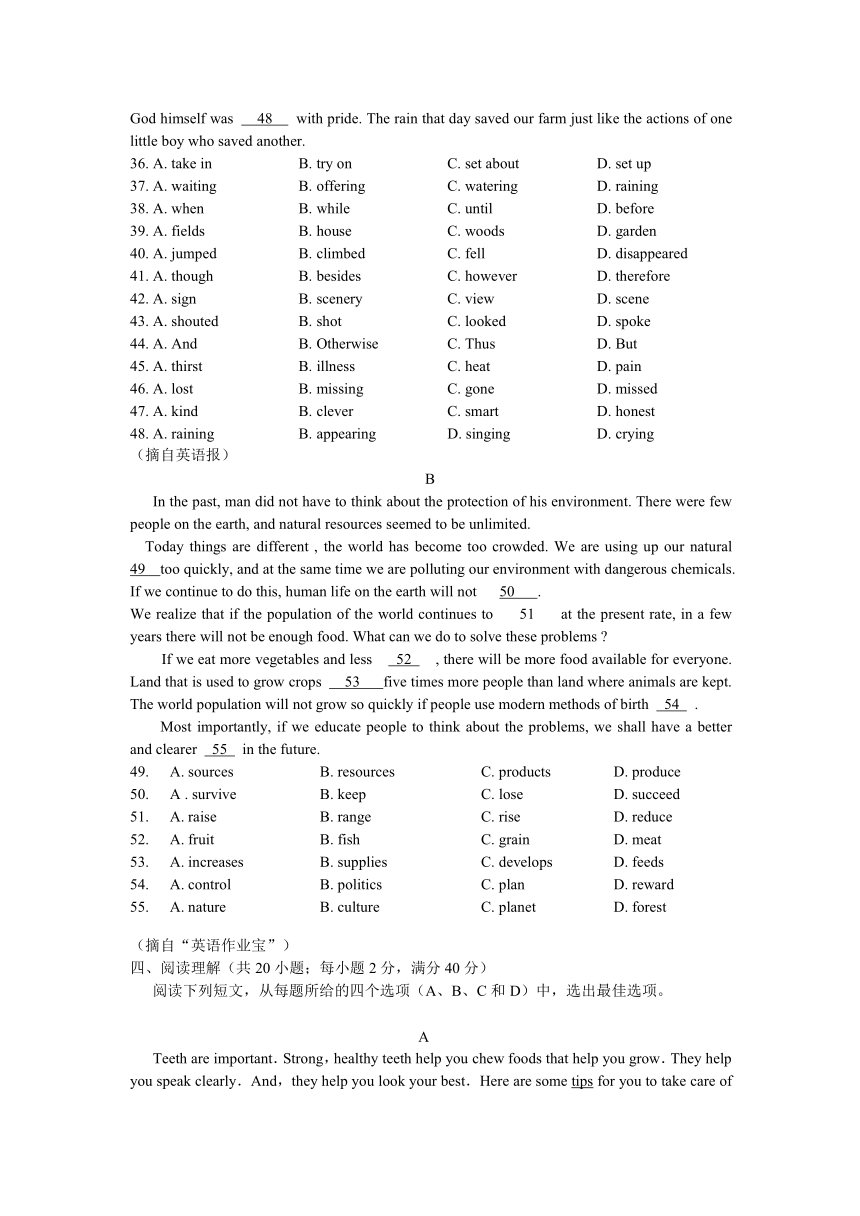
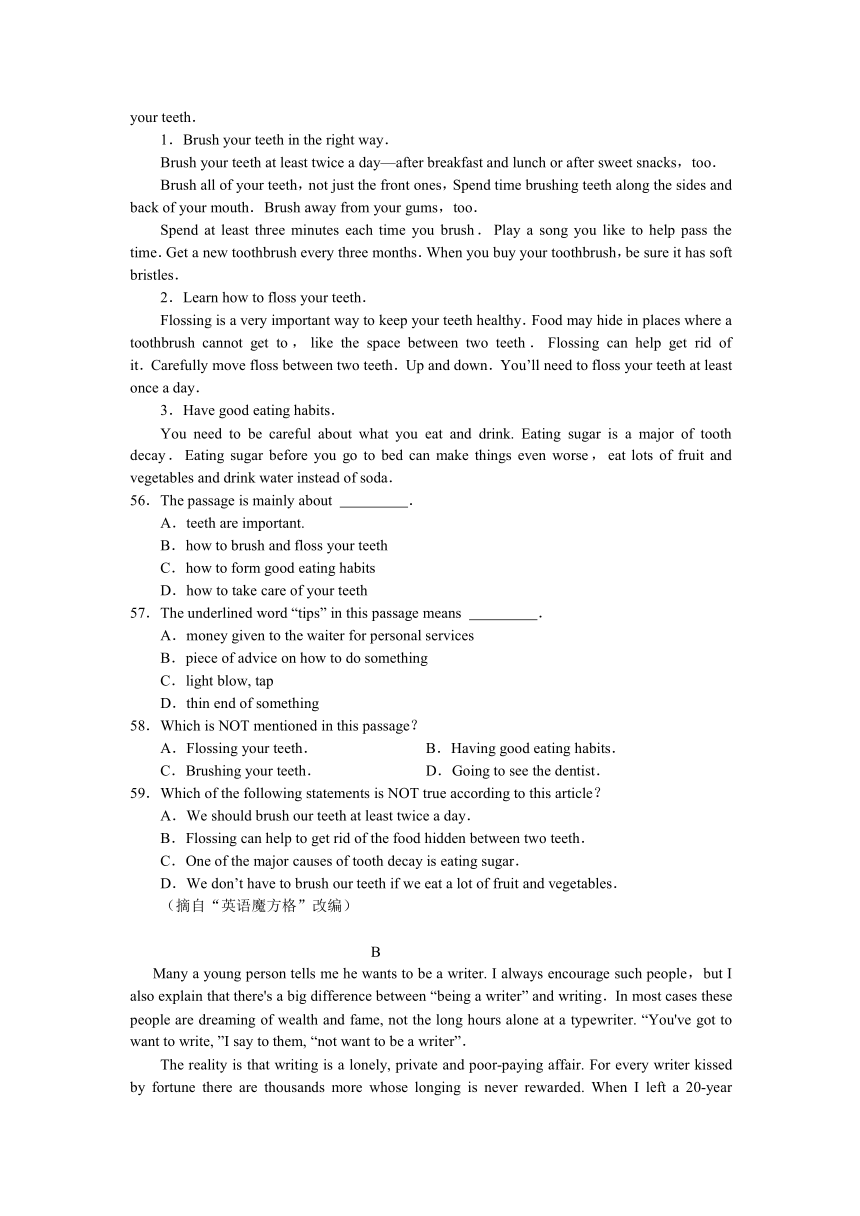
文档简介
2. What information does the man want?
A. The Pan-American Club. B.A lunch meeting. C. An international conference.
3. What does the woman ask the man to buy ?
A. Fruit. B. Vegetable. C. Bread.
4. Why does the man think friends are more important than money?
A. He doesn’t need money to make friends.
B. Friends can lend money to him. C. He can make money with friends.
5. How are the two speakers’ reports?
A. Bad. B. Good. C. One good, one bad.
第二节(共15小题;每小题1.5分,满分22.5分)
听下面5段对话或独白。每段对话或独白后有2至4个小题,从题中所给的A、B、C三个选项中选出最佳选项,并标在试卷的相应位置。听每段对话或独白前,你将有5秒钟的时间阅读各个小题;听完后,各个小题将给出5秒钟的作答时间。每段对话或独白读两遍。
听第6段材料,回答第6、7小题。
6. What did the man forget?
A. To take the concert tickets. B. To book the concert tickets . C. To go to the concert.
7. When did the woman remind the man?
A. �This week. B. Yesterday. C. This morning.
听第7段材料,回答第8、9小题。
8. What do the students complain about the dining hall?
A. The food. B. The food and price. C. The food , price and service.
9. How did the students show their dissatisfaction?
A. Sat in front of the dining hall. B. Had a students’ strike. C. Signed their names on a document
听第8段材料,回答第10至12小题。
10. What’s the boy’s dream?
A. Being an astronaut. B. Exploring the earth. C. Working in NASA.
11. How can astronauts contact with their family and friends?
A. By phone. B. By radio. C. By net.
12. When can astronauts use the laptop?
A. On Friday. B. At night. C. After work.
听第9段材料,回答第13至16小题。
13. How will the man ask for a leave ?
A. By an oral message. B. By a note. C. By a call.
14. What’s his excuse?
A. Helping friends. B. Attending other classes. C. Working in Students’ Government.
15. What can we learn about Professor Li’s class?
A. Only two thirds students attend. B. Most students chat through text messages.
C. Most students do other things or just sleep.
16. What does the man promise?
A. It’s the last time to ask the woman for help. B. It’s his last time to ask for leave.
C. It’s his last time to cheat Miss Li.
听第10段材料,回答第17至20小题。
17. What kind of the first person has Graham Hughes become?
A. Traveling around the world without money. B. Traveling around the world without planes.
C. Traveling around the world without help.
18. How long has he spent traveling around the world?
A. Around 1600 days. B.100 weeks. C. About 4 years.
19. Why was he arrested in the Congo?
A. For sneaking into. B. For no identity card. C. For being a “spy”.
20. What does he want to show the people?
A. The world is a big and miracle place. B. You can travel even you’re poor..
C. The world is small and full of good people.
(摘自二级英语听力考试模拟试题)
二、单项填空(15小题;每小题1分,满分15分) 请 从A、B、C、D四个选项中,选出可以填入空白处的最佳选项,并在答题卡上将该项涂黑。
21. ______ some food, they later sent some books, clothes and some other daily necessities to the children in poor areas.(原创)
A. Beside B. Apart from C. Except D. In addition
22. Though it’s not the 1st time that I ________Shanghai, I still can’t adjust myself to the weather. (摘自21世纪教育网模拟题)
A. been to B. had been to C. have been to D. went to
23. His interests include basketball, swimming and skating ____ studying his favorite subjects.
(原创)
A. less than B. as well as C. instead of D. rather than
24. In the center of the square _________ a statue which is the symbol of our school.
A. lying B. standing C lie D stands
25. Don’t take this book away, it ____you. (原创)
A. doesn’t belong to B. isn’t belonged to C. isn’t belonging to D. isn’t belong to
26. ______ in her most beautiful skirt, Jenny tried to make herself at the party.(原创)
A. Dressed; noticed B. Dressing; noticed
C. Dressed; noticing D. Dressing; being noticing
27.?Is?this?dictionary?_______?you bought?last?Sunday? (摘自英语“魔方格”定语从句练习) ? A . ?that B.?where C.?which D.?the?one 28. He is one of the boys who _____ here, and he is the only one of the boys who
_____ here on time. (原创)
A. has come; have come B. have come; has come
C. has come; has come D. have come; have come
29. ---What made you be late for school this morning?
--- _____ the early bus. (原创)
??? A.?Miss?????????B.?Because missing?????????C.?Missing?????????D.?For missing?
30. I’m sure she will _____, so we had better wait. (原创)
A. turn up B . turn down C . turn on D . turn off
31.Could you leave me alone, please? Your being here just _______ my trouble. (原创)
A. adds in B adds to C adds up D adds up to
32.______ be sent to attend the meeting? (原创)
A. Who do you suggest B. Who do you suggest that
C. Do you suggest who should D. Do you suggest whom should
33. —Where?is?Tom??
? —I?think?he?is?still?in?______?bed,?but?he?might?just?be?in?______study.?(原创)
?A.?不填;不填 B.?the;?the? C.?the;不填 D.?不填;?the
34. I have ____ him not to smoke for several times, but I can’t___ him. (原创)
A persuaded ; advised B. advised; persuaded
C. suggested; persuaded D . suggested; advised
35. ---Your oral English is great. You sound like an American native. (原创)
--- ________. I still have trouble expressing myself.
A. Yes, you are right. B. I don’t care
C. Well, not really D. I’m glad you like it.
三、完形填空(共20小题;每小题1.5分,满分30分) 阅读下面的短文,掌握其大意,然后从 36~55各题所给的四个选项(A、B、C
和D)中选出一个最佳选项,并在答题卡上将该项涂黑。? A
It was one of the hottest days of the dry season. We had not seen rain in almost a month. Every day, my husband would 36 the process of trying to get water to the fields. Unless we saw some rain soon, we would lose everything.
On this day I learned the true lesson of 37 and witnessed the only miracle(奇迹) I had ever seen. I was in the kitchen __38___ I saw my son, Billy, walking toward the 39 . He was walking with effort, trying to be as quiet as possible. Minutes after he 40 into the woods, he came running back. I went back to make sandwiches, thinking that whatever he had been doing was completed. Moments later, 41 , he was once more walking slowly toward the woods. This activity went on for an hour. Finally, I couldn’t help following him and saw the most amazing 42 .
Several large deer stood in front of him. Billy walked right up to them. I almost 43 at him to get away. A huge deer was dangerously close. 44 the deer didn't even move as Billy knelt down. I saw a tiny deer lying on the ground, obviously suffering from 45 , lift its head to lap up the water cupped in Billy’s hands. When the water was 46 , Billy ran back to get more. It then became clear to me.
I stood on the edge of the woods, watching the 47 boy working so hard to save another life. As my tears began to hit the ground, they were suddenly joined by other drops. It was as if the God himself was 48 with pride. The rain that day saved our farm just like the actions of one little boy who saved another.
36. A. take in
B. try on
C. set about
D. set up
37. A. waiting
B. offering
C. watering
D. raining
38. A. when
B. while
C. until
D. before
39. A. fields
B. house
C. woods
D. garden
40. A. jumped
B. climbed
C. fell
D. disappeared
41. A. though
B. besides
C. however
D. therefore
42. A. sign
B. scenery
C. view
D. scene
43. A. shouted
B. shot
C. looked
D. spoke
44. A. And
B. Otherwise
C. Thus
D. But
45. A. thirst
B. illness
C. heat
D. pain
46. A. lost
B. missing
C. gone
D. missed
47. A. kind
B. clever
C. smart
D. honest
48. A. raining
B. appearing
D. singing
D. crying
(摘自英语报)
B
In the past, man did not have to think about the protection of his environment. There were few people on the earth, and natural resources seemed to be unlimited.
Today things are different , the world has become too crowded. We are using up our natural 49 too quickly, and at the same time we are polluting our environment with dangerous chemicals. If we continue to do this, human life on the earth will not 50 .
We realize that if the population of the world continues to 51 at the present rate, in a few years there will not be enough food. What can we do to solve these problems ? If we eat more vegetables and less 52 , there will be more food available for everyone. Land that is used to grow crops 53 five times more people than land where animals are kept. The world population will not grow so quickly if people use modern methods of birth 54 . Most importantly, if we educate people to think about the problems, we shall have a better and clearer 55 in the future.
49.
A. sources
B. resources
C. products
D. produce
50.
A . survive
B. keep
C. lose
D. succeed
51.
A. raise
B. range
C. rise
D. reduce
52.
A. fruit
B. fish
C. grain
D. meat
53.
A. increases
B. supplies
C. develops
D. feeds
54.
A. control
B. politics
C. plan
D. reward
55.
A. nature
B. culture
C. planet
D. forest
(摘自“英语作业宝”)
四、阅读理解(共20小题;每小题2分,满分40分) 阅读下列短文,从每题所给的四个选项(A、B、C和D)中,选出最佳选项。
A
Teeth are important.Strong,healthy teeth help you chew foods that help you grow.They help you speak clearly.And,they help you look your best.Here are some tips for you to take care of your teeth.
1.Brush your teeth in the right way.
Brush your teeth at least twice a day—after breakfast and lunch or after sweet snacks,too.
Brush all of your teeth,not just the front ones,Spend time brushing teeth along the sides and back of your mouth.Brush away from your gums,too.
Spend at least three minutes each time you brush.Play a song you like to help pass the time.Get a new toothbrush every three months.When you buy your toothbrush,be sure it has soft bristles.
2.Learn how to floss your teeth.
Flossing is a very important way to keep your teeth healthy.Food may hide in places where a toothbrush cannot get to,like the space between two teeth.Flossing can help get rid of it.Carefully move floss between two teeth.Up and down.You’ll need to floss your teeth at least once a day.
3.Have good eating habits.
You need to be careful about what you eat and drink. Eating sugar is a major of tooth decay.Eating sugar before you go to bed can make things even worse,eat lots of fruit and vegetables and drink water instead of soda.
56.The passage is mainly about .
A.teeth are important.
B.how to brush and floss your teeth
C.how to form good eating habits
D.how to take care of your teeth
57.The underlined word “tips” in this passage means .
A.money given to the waiter for personal services
B.piece of advice on how to do something
C.light blow, tap
D.thin end of something
58.Which is NOT mentioned in this passage?
A.Flossing your teeth. B.Having good eating habits.
C.Brushing your teeth. D.Going to see the dentist.
59.Which of the following statements is NOT true according to this article?
A.We should brush our teeth at least twice a day.
B.Flossing can help to get rid of the food hidden between two teeth.
C.One of the major causes of tooth decay is eating sugar.
D.We don’t have to brush our teeth if we eat a lot of fruit and vegetables.
(摘自“英语魔方格”改编)
B
Many a young person tells me he wants to be a writer. I always encourage such people,but I also explain that there's a big difference between “being a writer” and writing.In most cases these people are dreaming of wealth and fame, not the long hours alone at a typewriter. “You've got to want to write, ”I say to them, “not want to be a writer”.
The reality is that writing is a lonely, private and poor-paying affair. For every writer kissed by fortune there are thousands more whose longing is never rewarded. When I left a 20-year career in the U.S. Coat Guard to become a freelance writer, I had no hope at all.What I did have was a friend who found me a room in a New York apartment building.It didn't even matter that it was cold and had no bathroom.I immediately bought a used typewriter and felt like a real writer.
After a year or so.However, I still hadn't gotten a break and began to doubt myself.It was so hard to sell a story that I hardly made enough to eat.But I knew I wanted to write,l had dreamed about it for years.I wasn't going to be one of those people who die wondering, what if? I would keep putting my dream to the test—even though it meant living with uncertainty and fear of failure.This is the shadow land of hope,and anyone with a dream must learn to live there.
60.The purpose of the passage is to .
A.warn young people of the hardships that a successful writer has to experience
B.advise young people to give up their idea of becoming a professional writer
C.show young people it's unrealistic for a writer to seek wealth and fame
D.encourage young people to be a writer over a long period of time
61.What can be concluded from the passage?
A.Real writers often find their work interesting and rewarding.
B.A writer's success depends on luck rather than on effort.
C.Famous writers usually live in poverty.
D.The chances for a writer to become successful are little.
62.Why did the author begin to doubt himself after the first year of his writing career?
A.He wasn't able to produce a single book.
B.He hadn't seen a change for the better.
C.He wasn't able to have a rest for a whole year.
D.He found his dream would never come true.
63.“…people who die wondering,what if?” refers to “those ”.
A.who think too much of the dark side of life
B.who regret giving up their career halfway
C.who think a lot without making a decision
D.who are full of imagination even upon death
64.“shadow land” in the last sentence means .
A.the wonderland one often dreams about
B.the bright future that one is looking forward to
C.the state of uncertainty before one's final goal is reached
D.a world that exists only in one's imagination
(摘自高中英语网)
C
Some scientists say that animals in the ocean are increasingly threatened by noise pollution caused by human beings. The noise that affect sea creatures comes from a number of human activities. It is caused mainly by industrial underwater explosions, ocean drilling, and ship engines. Such noises are added to natural sounds. These sounds include the breaking of ice fields, underwater earthquakes, and sounds made by animals themselves.
Decibels(分贝)measured in water are different from those measured on land. A noise of one hundred and twenty decibels on land causes pain to human ears. In water, a decibel level of one hundred and ninety-five would have the same effect.
Some scientists have proposed setting a noise limit of one hundred and twenty decibels in oceans. They have observed that noises at that level can frighten and confuse whales.
A team of American and Canadian scientists discovered that loud noises can seriously injure some animals. The research team found that powerful underwater explosions were causing whales in the area to lose their hearing. This seriously affected the whales’ ability to exchange information and find their way. Some of the whales even died. The explosions had caused their ears to bleed and become infected.
Many researchers whose work depends on ocean sounds object to a limit of one hundred and twenty decibels. They say such a limit would mean an end to important industrial and scientific research.
Scientists do not know how much and what kinds of noises are harmful to ocean animals. However, many scientists suspect that noise is a greater danger than they believed. They want to prevent noises from harming creatures in the ocean.
65. According to the passage, which of the following is increasingly dangerous to sea creatures?
A. The man-made noises.
B. The noises made by themselves.
C. The sound of earthquakes.
D. The sound of the ice-breaking.
66. As to the influence of noises on whales, which of the following statements is true?
A. They are deaf to noises.
B. Noises at a certain level may hurt them.
C. They are easily confused by noises.
D. Noises will limit their ability to reproduce.
67. We can know from the passage that many scientists think that the noise limit of one hundred twenty decibels would______.
A. prevent them from doing their research work
B. benefit them a lot in their research work
C. do good to their health
D. increase the industrial output
68. According to the passage, what will scientists most probably do in the future?
A. They will try their best to decrease noise.
B. They will work hard to cut down noise pollution.
C. They will study the effect of different noises.
D. They will protect animals from harmful noises.
(摘自高中英语网)
D
Informal conversation is an important part of any business relationship.Before you start a discussion,however,make sure you understand which topics are suitable and which are considered taboo(禁忌)in a particular culture. Latin Americans enjoy sharing information about their local history, art and customs.You may expect questions about your family,and be sure to show pictures of your children.You may feel free to ask similar questions of your Latin American friends.The French think of conversation as an art form,and they enjoy the value of lively discussions as well as disagreements. For them,arguments can be interesting and they can cover pretty much or any topic ---- as long as they occur in are respectful and intelligent manner.
In the United States,business people like to discuss a wide range of topics,including opinions about work,family,hobbies,and politics. In Japan,China,and Korea,however,people are much more private.They do not share much about their thoughts,feelings,or emotions because they feel that doing so might take away from the harmonious business relationship they’re trying to build.Middle Easterners are also private about their personal lives and family matters.It is considered rude,for example,to ask a businessman from Saudi Arabia about his wife or children.
As a general rule,it’s best not to talk about politics or religion with your business friends.This can get you into trouble,even in the United States,where people hold different religious views.In addition,discussing one’s salary is usually considered unsuitable.Sports is typically a friendly subject in most parts of the world,although be careful not to criticize national sport.Instead,be friendly and praise your host’s team.
69.The author considers politics and religion ___________.
A.cheerful topics B.taboo
C.rude topics D.topics that can never be talked about
70.Which is typically a friendly topic in most places according to the author?
A.Sports. B.Children.
C.Personal feelings. D.Families.
71.Why are people from Asia more private in their conversation with others?
A.They don’t want to talk much with others.
B.They don’t want to have their good relationship with others harmed by informal conversation。
C.They are afraid to argue with their colleagues.
D.They want to keep their feelings to themselves.
72.What shouldn’t you do when talking about sports with colleagues from another country?
A.Praising your own country’s sports.
B.Criticizing your own country’s sports.
C.Praising the sports of your colleagues’ country.
D.Criticizing the sports of your colleagues’ country.
(摘自学优高考网)
E
Looking out of the window, my son saw a tree whose branches were strongly swaying back and forth. “How does the tree move its branches like that?” He asked.
Without rising from my chair, nor looking up from my book, I started to answer, “The tree is not moving the branches, son. The wind is…” But before the words were out, I caught myself. Instead I rose from my chair and moved to the window to join my son. I looked at the tree. From inside our room, from behind the window, I could neither feel nor hear the wind. I saw instead a tree with its branches silently moving and thought to myself, from inside this room, how could I possibly be sure that the branches were moving because of the wind rather than from the tree’s own willing?
As I stood there with my son watching the tree, I became struck by the movement of the branches, the shimmer of the leaves. My mind quieted and I became less sure myself of what was causing the branches to move. Was it the wind, or was it some expressive, independent movement of the tree? “I see what you mean,” I said to my son. “The movement of the tree is very beautiful.”
“Do you think the tree is dancing?” asked my son. “Why would it be dancing?” I asked. “Maybe it is happy because the sun is shining,” he said. “Perhaps,” I said. “Or because it’s spring,” he added, “and it’s not cold any more.” “Perhaps,” I said.
As we continued to watch the tree together, I, too, began to appreciate the dance of the tree. I enjoyed the movement and sway of the branches, seeing little nuances(微妙之处) that I hadn’t noticed before. There seemed to be a rhythm to the movement, first strong and forceful, then light and gentle, then more vigorous, sometimes nearly violent.
“Are trees alive?” my son asked. “Yes, they are alive. Why do you ask?” “Because this tree looks happy,” he answered. “Can a tree be happy or sad?” “What do you mean?” I asked.
“In the winter, trees seem sad,” he said. “Their branches hang down, and they look cold and lonely. But now with the leaves on the tree and the sun shining and the birds flying, it looks happy.”
73. What is the meaning of the underlined word “caught” in Para 2?
A. stopped B. grasped C. seized D. held
74. What on earth caused the tree to move?
A. The tree itself felt happy and was dancing.
B. The tree was too sad to sway as if to get rid of all trouble.
C. It was the warm spring.
D. The wind did so.
75. What do you think of the boy?
A. Naughty. B. Imaginative. C. Clever. D. Foolish.
(摘自无忧题库网)
第二卷
五、 写作(共两个写作任务,满分35分)
写作一(满分15分)
请结合材料,按要求用英文写作。
Too many students, school life is boring and tiring. However, I find my school life meaningful and colorful.
要求:(1)就此材料发表你的看法; (2)紧扣材料,有明确的观点;(3)不少于60词。
(原创)
写作二(满分20分)
最近,你们班召开了以“我的中国梦”为主题的班会活动,每位同学都畅谈了自己对中国梦的理解。请写一篇日记,记述班会情况及自己的感受。内容要点如下:
1.同学们谈到中国梦纷纷表示大受鼓舞;
2.你谈到了自己的梦想;
3.如何实现自己的梦想。
注意: (1)词数不少于80.
(2)日记格式及开头均已给出(不计入总词数)。(原创)
Oct.27, 2014, Monday Sunny
Recently we had a class meeting on the topic of My Chinese Dream.
四、阅读理解
56-59 DBDD 60-64 ADBCC 65-68 ABAD
69-72 BABD 73-75 ADB
同课章节目录
